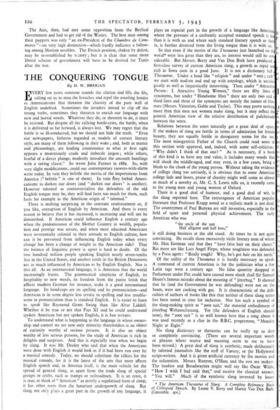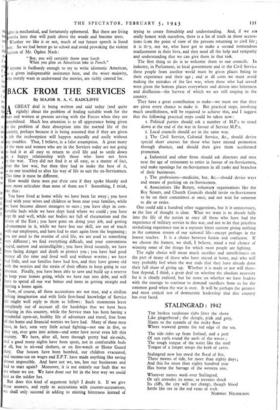THE CONQUERING TONGUE
By D. W. BROGAN
EVERY few years someone sounds the clarion and fills the fife, calling on us to man the breaches and repel the assailing hordes or Americanisms that threaten the chastity of the pure well of English undefiled. Sometimes the invaders intend to clip off the strong verbs, sometimes they threaten to enrich our language with new and horrid words. Whatever they do, or threaten to do, it must be resisted. But despite all the rallying battle-cries, the battle, when it is delivered so far forward, is always lost. We may regret that the battle is so ill-conducted, but we should not hide the truth. '" Even our newspapers, hitherto regarded as models of correct literary style, are many of them following in their wake ; and, both in matter and phraseology, are lending countenance to what at first sight appears a monstrously crude and imbecile jargon ; while others, fearful of a direct plunge, modestly introduce the uncouth bantlings with a saving clause." So wrote John Farmer in 1889. So, with very slight modifications, could our contemporary viewers-with-alarm write today. In vain they belittle the merits of the importations from America (" belittle " is one of them). In vain they forbid Ameri- canisms to darken our doors (and " darken our doors is another). However talented as controversialists the defenders of the old English tongue may be, they will find facts too much for them, such facts for example as the American origin of " talented."
There is nothing surprising in the constant reinforcement or, if you like, corruption of English by American. And there is every reason to believe that it has increased, is increasing and will not be diminished. If American could influence English a century ago when the predominance of the Mother Country in wealth, popula- tion and prestige was secure, and when most educated Americans were reverentially colonial in their attitude to English culture, how can it be prevented from influencing English today when every change has been a change of weight to the American side? That the balance of linguistic power is upset is hard to doubt. Of the two hundred million people speaking English nearly seven-tenths live in the United States, and another tenth in the British Dominions are as much influenced by American as by English English. Nor is this all. As an international language, it is American that the world increasingly learns. The grammatical simplicity of English, its hospitality to new words, its freedom from the purist fetish that afflicts modern German for instance, make it a good international language. Its handicaps are its spelling and its pronunciation—and American is in some degree less erratic in spelling and less trouble- some in pronunciation than is standard English. It is easier to learn to speak like Raymond Gram Swing than like Alvar Liddell. Whether it be true or not that Pius XI said he could understand spoken American but not spoken English, it is ben trovato.
To understand what is happening to the language in whose owner- ship and control we are now only minority shareholders is an object of curiosity worthy of serious persons. It is also an object worthy of less serious persons, for the study of American is rich in delights and surprises. And this is especially true when we begin by slang. It was Mr. Dooley who said that when the Americans were done with English it would look as if it had been run over by a musical comedy. Today, we should substitute the talkies for the musical comedy, for it is the latest of the arts that most affects English speech and, in America itself, is the main vehicle for the spread of general slang, as apart from the trade slang of special groups or crafts, such .as tramps or railroadmen. It is an error, it is true, to think of " American " as merely a regularised form of slang; it has other roots than the luxuriant undergrowth of slang. But slang not on:y Vays a great part in the growth of any language, it plays an especial part in the growth of a language like Ameri where the pressure of a uniformly accepted standard speech is I than it is with us and where such standard literary speech as ther is, is further divorced from the living tongue than it is with us.
So that even if the merits of the Thesaurus just launched on th worid* were less great than they are, its interest would still be con siderable. - But Messrs. Berry and Van Den Bark have produced first-class survey of current American slang, a growth as rapid rich as Iowa corn in a good June. It is not a dictionary but Thesaurus. Under a head like " religion " and under " sect ; cult we start with nudism and end up with astrology, which is social gically as well as linguistically interesting. Then under " Attractiv Person: I. Attractive Young Woman," there are fifty lines synonyms, but under " Handsome Man " there are only two and a third lines and three of the synonyms are merely the names of film. stars (Messrs. Valentino, Gable and Taylor). This may prove nothing more than that men not women make slang, but it may reflect the general American view of the relative distribution of pulchritude between the sexes.
Relations between the sexes naturally get a great deal of space. o If the makers of slang are fertile in terms of admiration for female beauty, they are equally fertile in derogatory terms for the sex. The most misogynistic Father of the Church could read some of this section with approval, and, indeed, with some self-criticism: " Why didn't I think of that one? " As is necessary, if a book of this kind is to have any real value, it includes many words that will shock the middle-aged, and may even, in a few cases, bring a blush to the cheek of the young person. Without taking the evidence of college slang too seriously, it is obvious that to some American college lads and lasses, praise of chastity might well come as almost as much of a novelty as, Mr. C. S. Lewis tells us, it recently came to the young men and young women of Oxford.
There is a good deal of humour, and a good deal of wit, in the slang reported here. The extravagance of American popular literature that Professor Krapp noted as a stylistic mark is not dead. The countrymen of Paul Bunyan are still inventive, especially in the field of sport and personal physical achievement. The early American who was " the uncle of the sun Half alligator and half hoss," is still doing business at the old stand. At times he is not quite convincing. He recalls those excessively virile literary men of whom Mr. Max Eastman said that they " have false hair on their chests." But more are like Luis Angel Firpo, whose toughness was defended by a Press agent: " Really tough? Why, he's got hair on his teeth."
Of the utility of the Thesaurus it is hardly necessary to speak. A command of current American is for the politician what a few Latin tags were a century ago. No false quantity dropped in Parliament under Pitt could have caused more shock that Sir Samuel Hoare's famous mistake about the meaning of " jitterbug." It showed that he (and the Government he was defending) were not on the beam, were not cooking with gas. It is characteristic of the diffi- culties of authors of books like this that neither of these slang terms has been noted in time for inclusion. Nor has such a symbol of the slang-making spirit as " zoot suit," the material embodiment of jitterbug Weltanschauung. Yet (the defenders of English should note), the " zoot suit " is so well known here that a song about it was used recently as a clue in the B.B.C. programme, "Monday Night at Eight."
No slang dictionary or thesaurus can be really up to date or completely convincing. (There are several important words or phrases whose source and meaning seem to me to have been missed.) A great deal of slang is synthetic, made deliberately by talented journalists like the staff of Variety, or the Hollywood
script-writers. And it is given artificial currency by the movies and the columnists. Messrs. Runyon, O'Hara and the rest are makers. The hoofers and Broadwayites might well say like Oscar Wilde, "How I wish I had said that," and receive the classical answer, "You will." Much of the synthetic slang invented by lesser * The American Thesaurus of Slang. A Complete Reference Bock of Colloquial Speech. By Lester V. Berry and Martin Van Den Bark. (Constable. 4os.)
11
hts is mechanical, and fortunately ephemeral. But there are living wths here that will push above the weeds and become trees.
Whether we like it or not, much of our future speech is listed ere. So we had better go to school and avoid provoking the violent eaction of Mr. Ogden Nash: " Boy, you will certainly throw your lunch When you glim an Amurrican joke in Punch."
anyone is foolhardy enough to try to write idiomatic American, e is given indispensable assistance here, and the wiser majority, ho merely want to understand the movies, are richly catered for.



























 Previous page
Previous page